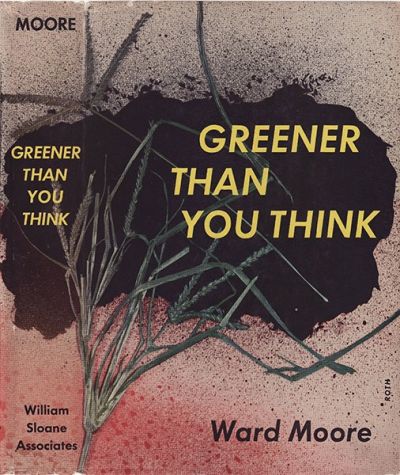Green Grow the Rushes, O
Greener Than You Think
By Ward Moore

3 May, 2020
Ward Moore’s 1947 Greener Than You Think is an apocalypse novel in which Albert Weener, salesman par excellence, relates the thrilling events of the last twenty-one years, events in which he played a very central role.
It begins with the metamorphizer invented by Josephine Spencer Francis.
J. S. Francis wanted to end famine forever. Her metamorphizer formula is guaranteed to induce rapid plant growth. Thus far she has only managed to make it work on grasses. Many food crops are belong to the family Gramineae; this could be a great advance. Francis is determined to produce a universal metamorphizer.
Weener on the other hand is a clear-eyed pragmatist far more interested in immediate returns than the airy-fairy future. Ending famine sounds good, but Weener wants cash now. Hired by Francis to sell her expensive product, Weener focuses on something that he is convinced will sell in huge volume. an aid to beautiful lawns.
Half a pint of Francis’ formula applied directly to Mrs. Dinkman’s half-dead lawn works a miracle. Overnight, the Bermuda grass — devilgrass in common vernacular, sometimes also known as crabgrass — turns into a veritable thicket.
But there’s an unanticipated consequence. The Bermuda grass can’t be killed. Grows back almost instantaneously if cut. It spreads rapidly, limitlessly. It surrounds and overwhelms the Dinkman house. In the end, the family is forced to abandon their home.
The Bermuda grass has no respect for property lines. The Dinkman house is only the first dwelling lost to the rapacious grass. As the green tsunami sweeps across Los Angeles, officials slowly begin to grasp the scale of the problem. Los Angeles and the state of California have far more impressive weapons to bring to bear on the grass. Alas, all prove just as ineffective as lawnmowers and scythes. In the end, Los Angeles is lost. California must be next.
A solution is proposed: a band of salt twenty miles wide, stretching from Oceanside to the Salton Sea, from the Salton Sea to the little town of Mojave and from there to Ventura. That should hold the grass at bay.
But it doesn’t.
The grass spreads inexorably across America. The United States is clearly doomed, as are all the other nations of the Americas. If oceans can’t stop it, farewell humanity.
Lesser men might despair. Weener is no such weakling. Cities, nations, even entire continents may fall to the grass. Weener never loses his focus on what really matters: profit!
~oOo~
This was a very 1947 novel. Cue content warning for racism, sexism, classism. However, I suspect that the author is primarily concerned to mock human prejudice and stupidity. The protagonist is loathsome, the other characters are knuckleheads. Add to the content warning: misanthropy.
Weener provides first-person narration. He thinks of himself as a fine man, but his narration reveals him to be sexist and off-handedly racist. He’s a monumentally greedy conman who dooms the entire planet because he wanted to make a fast buck. The end of the world is narrated by a man who assesses events in terms of how much money he can make and how much personal inconvenience is caused by the famine deaths of a couple of billion people.
Another author might have written this as a melodrama. Moore treats the end of the world as comedy, using the inexorable spread of the grass to lampoon society’s foibles. Mere looming mass extinction isn’t enough to cure humanity of short-sighted ignorance, of attempting to apply Band-Aids to severed legs. Horrors abound but one gets the sense that while individual humans might have deserved better, humanity as a whole deserved its fate.
The book is a bit too long for the slightness of the joke — an odd complaint for a book of this vintage, when books tended to be short. It might have been more bearable as a short story. Still, if you’d like to spend a couple of hours experiencing the entirely unnecessary demise of the human race through the eyes of an unselfconsciously reprehensible man, Greener Than You Think is available on Project Gutenberg.
